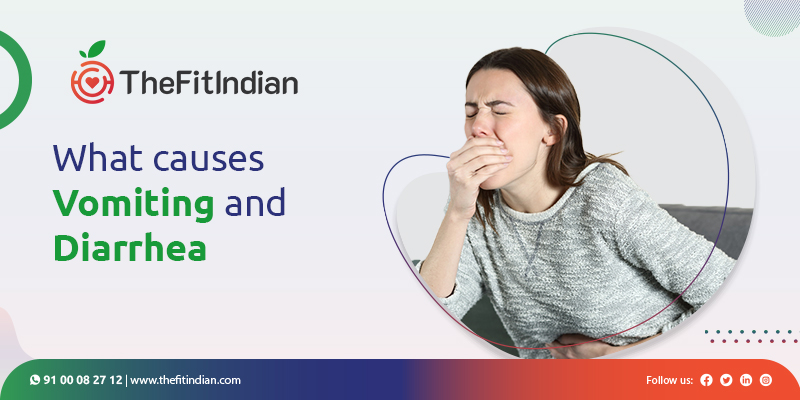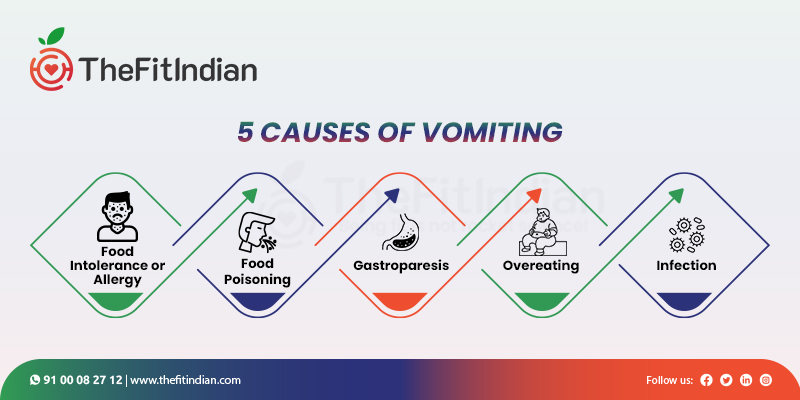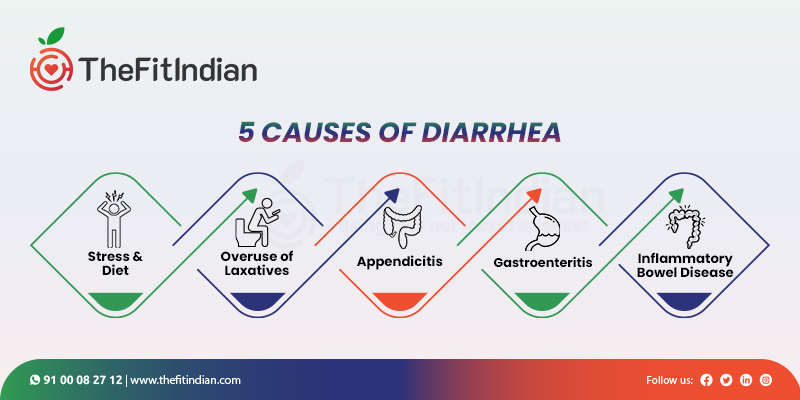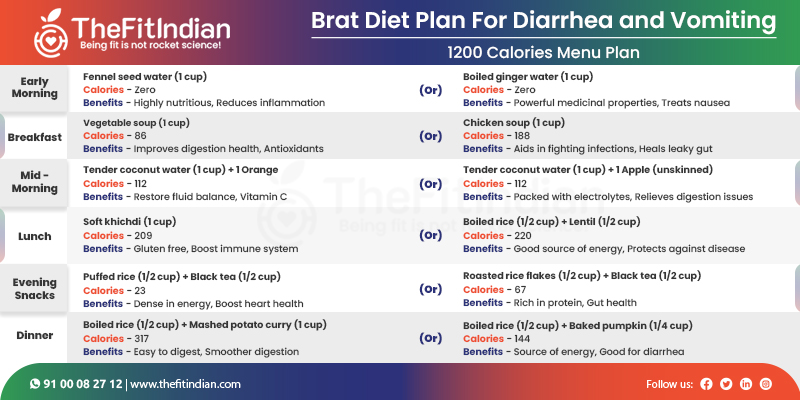Vomiting And Diarrhea: Causes, Treatment, and Symptoms
Reviewed by: Dr. T S Deepthi Sarojini | Author: Manoja Kalakanti

In everyday life, vomiting and diarrhea are common symptoms. Vomiting is not a disease in and of itself. Instead, it could be a symptom of a more severe condition. The involuntary, assertive expulsion of stomach contents through the mouth is known as emesis. Nausea is a common sign of many diseases and conditions. Vomiting causes stomach discomfort, which incites a person to vomit. Vomitus is highly acidic and foul-smelling vomited matter. An emetic is a substance or medicine that causes vomiting. For example, emetics such as ipecac induce vomiting and expel toxic substances from the body before they are absorbed.
Diarrhea is characterized by loose, watery stools and is typically caused by insufficient water uptake during digestion or extra fluid leaking into the stool. The condition usually lasts two to four days, and the symptoms go away. However, chronic diarrhea lasts more than four weeks, sporadically or consistently, and indicates an underlying medical condition. In addition, various bacteria, viruses, and other germs can cause diarrhea.
5 Causes of Vomiting

Several conditions can cause vomiting. For example, it could be a specific response to stomach problems or a symptom of an infection elsewhere in the body.
1. Infection
Gastroenteritis, also known as stomach flu, is an intestinal infection with watery diarrhea, abdominal cramps, nausea or vomiting, and, in some cases, fever.
2. Food Poisoning
Food poisoning caused by bacteria-infected food can cause nausea, vomiting, and other symptoms such as fever, abdominal pain, and diarrhea. Bacteria that can cause food poisoning include Campylobacter, Salmonella, Shigella, E. Coli, Listeria, and others.
3. Gastroparesis
This is a condition in which the stomach muscles do not function properly due to nerve damage, resulting in incomplete stomach emptying. This can disrupt normal digestion and result in nausea and vomiting. Nausea and vomiting can be caused by disorders such as dyspepsia, GERD, peptic ulcer, or irritable bowel syndrome (IBS), but they are rarely the primary vomiting feeling causes.
4. Overeating
Overeating can cause nausea and vomiting because the digestive system cannot correctly process the food. It is prevalent in people who have a weak digestive system or who have had surgery that reduces the digestive system’s functional capacity.
5. Food Intolerance or Allergy
Certain foods can cause sudden vomiting in people with food allergies or intolerances. A change in diet or dietetic deceits can also cause nausea and vomiting.
5 Causes Of Diarrhea

Several factors can cause diarrhea. For example, a viral infection, the food you eat, or travel can cause temporary diarrhea that lasts one to two days.
Chronic diarrhea, on the other hand, may indicate a more severe problem. The most common diarrhea causes are as follows:
- Inflammatory Bowel Disease
- Stress and Diet
- Overuse of Laxatives
- Gastroenteritis
- Appendicitis
- IBD
1. Inflammatory bowel diseases (IBD)
which include Crohn’s disease, Ulcerative Colitis, and other types of colitis, are chronic inflammatory diseases. IBD destroys the tissue and inflames the bowel walls, limiting the body’s ability to absorb fluids. This results in loose, watery, or even wholly liquid stools.
Because fluid moves more quickly through the intestine, patients with IBD may have frequent and urgent bowel movements. You may also notice blood in or on your stool and severe weight loss, anemia, fever, and loss of appetite.
2. Diet and Stress
People going through a lot of stress may lose their appetite or find sitting down for proper, nutritious meals challenging. In addition, stress impairs digestion on its own. If this way of life is maintained, an individual may develop chronic diarrhea. Therefore, when all other medical conditions have been ruled out, one should reconsider their schedule and consider slowing down and focusing on personal health to avoid triggering gastrointestinal disorders.
3. Overuse of Laxatives
Taking too many laxatives or longer than recommended can result in problematic diarrhea. Laxatives that draw water into the intestines soften the stool. As a result, excessive use can result in dehydration and lightheadedness. Dehydration-induced electrolyte imbalances aggravate diarrhea and increase the risk of complications, such as kidney failure.
4. Gastroenteritis
Gastroenteritis is a stomach or intestine inflammation caused by bacteria, viruses, or parasites. People suffering from gastroenteritis typically experience nausea, vomiting, and diarrhea. Mild cases do not require medication because the body rids itself of the infection through these effects. However, it is mandatory to drink plenty of liquids to keep the body hydrated while suffering from this illness.
5. Appendicitis
Appendicitis, or appendicitis inflammation, causes diarrhea and abdominal cramps in one out of every five people. When the appendix becomes blocked and inflamed, it can cause symptoms such as abdominal pain, a fever of 99 to 102 degrees Fahrenheit, indigestion, flatulence, and diarrhea. Watery stools usually appear after the onset of abdominal aches. If not treated promptly, appendicitis can be fatal.
Though many factors can cause diarrhea, and some cases may be unavoidable due to a virus or other infection, typically healthy people can take steps to reduce their risk. For example, a balanced diet with the right amount of fiber, washing your hands thoroughly, and avoiding unwanted sources of infection, such as non-bottled water while traveling, can keep movements appropriately firm.
Can vomiting be prevented?
The most common cause of vomiting, viral gastroenteritis, is highly contagious and is spread primarily through contact with another person who is ill.
What you can do to prevent the spread of gastroenteritis:
- Use a good handwashing technique and wash your hands frequently.
- Maintain good food safety.
- If a family member has gastroenteritis, everyone in the house should wash their hands frequently and maintain good hygiene.
- Anyone suffering from gastroenteritis should avoid going to hospitals or swimming pools.
- Wear gloves, an apron, and a mask when cleaning up vomit. Put it in a tied plastic bag and then wash your hands. Use detergent and warm water to clean the area.
- Vomiting caused by certain conditions, such as motion sickness, may be relieved by eating dry crackers or ginger.
Is it possible to avoid diarrhea?
There is no shortage of information available on home remedies for diarrhea. However, only some homes remedy will work for some types of diarrheas or some people. The most challenging aspect of treating diarrhea is that there is no one-size-fits-all treatment plan. Many cases of mild diarrhea will go away on their own. However, several natural remedies and treatments are available for more severe, chronic cases of diarrhea. While most people associate fiber with preventing constipation and thus the inverse of easing diarrhea, soluble fiber can also absorb excess water and harden the stool. Taking probiotics can also help reduce diarrhea.
Diet For Diarrhea And Vomiting
An upset stomach or diarrhea can make you unhappy. Left untreated can cause exhaustion and dehydration, so nourishing your body is critical. However, deciding what to eat after vomiting or having diarrhea can be difficult. Both can be effectively treated with the BRAT diet (Bananas, Rice, Applesauce, and Toast).
The BRAT diet is a healthy, balanced diet suitable for adults and children. The following are the advantages of using the BRAT diet to treat vomiting and diarrhea:
- The foods in the diet firm up your stools. This is due to the foods’ status as binding foods. They are foods that are low in fiber, bland, and starchy.
- The foods help your body replace nutrients lost due to vomiting and diarrhea. Bananas, for example, contain a lot of potassium.

Things To Consider
- Stick to sips of clear liquids first. Then, if you’ve been vomiting or having diarrhea, try drinking an electrolyte-containing beverage to keep your body hydrated.
- Solid foods, such as those found in the BRAT diet, are not advised for adults and children who are actively vomiting. Once you’ve stopped vomiting, gradually introduce foods to see if you can eat them without vomiting.
- Follow your doctor’s advice on what foods to eat when dealing with throwing up or diarrhea.
- Return to a regular, healthy diet as you feel better. Unfortunately, the BRAT diet does not supply all the nutrients required for a healthy diet. However, within 24 to 48 hours, you should be able to resume a more nutritious diet, including fruits and vegetables.
Bottom Line
Are you ready to troubleshoot your vomiting and diarrhea? Learn more about your digestive health and the natural approach to resolving diarrhea and vomiting once and for all. Visit us at The Fit Indian Blog for more articles on diseases and conditions and contact our Nutritionist for more diet advice.
FAQ’s
1. What causes vomiting and diarrhea?
Some of the most common signs of vomiting and diarrhea include
- Loss of Appetite
- Food Poisoning
- Stress and Anxiety
- Viral Ga
- Gastroenteritis
- Traveler’s Diarrhea
2. What is the best diet for diarrhea relief?
The BRAT diet is the best for diarrhea relief because it includes: Cream of Wheat or farina soda crackers is examples of cooked cereal. Fruits juices like apple juice and applesauce
3. What to eat when you have diarrhea and vomiting?
Because it is gentle on the stomach, a BRAT diet is recommended for nausea, vomiting, and diarrhea. Bananas are also high in potassium, an electrolyte that can be depleted by diarrhea. Rice White rice is low in fiber and is one of the foods you can try to eat if you have diarrhea.
4. Is orange juice good for diarrhea?
Yes. People suffering from diarrhea can benefit from drinking orange juice. Orange juice contains electrolytes such as potassium and magnesium, which aid in the replacement of lost fluids.
5. Best electrolytes for vomiting & diarrhea?
In general, fluid therapy is the most potentially life-saving and vital therapeutic measure in a critically ill pet suffering from dehydration due to gastrointestinal losses. The best electrolytes are calcium, chloride, potassium, magnesium, and sodium.
6. Is coconut water good to drink?
Yes. Coconut water is the best electrolyte to retain lost fluids.
7. How to help with diarrhea and vomiting?
Home remedies can help alleviate vomiting and diarrhea symptoms. Drinking ginger tea or ginger ale, sucking peppermint candies like zinc, or mixing oral rehydration sachets with water to make a drinking medicine to stop diarrhea are all options.
8. How to get rid of diarrhea?
Mucilage has anti-diarrheal properties that can aid in the relief of stomach pain and the cessation of diarrhea. Chew one teaspoon of fenugreek seeds to treat diarrhea with one tablespoon of yogurt.




Manoja Kalakanti